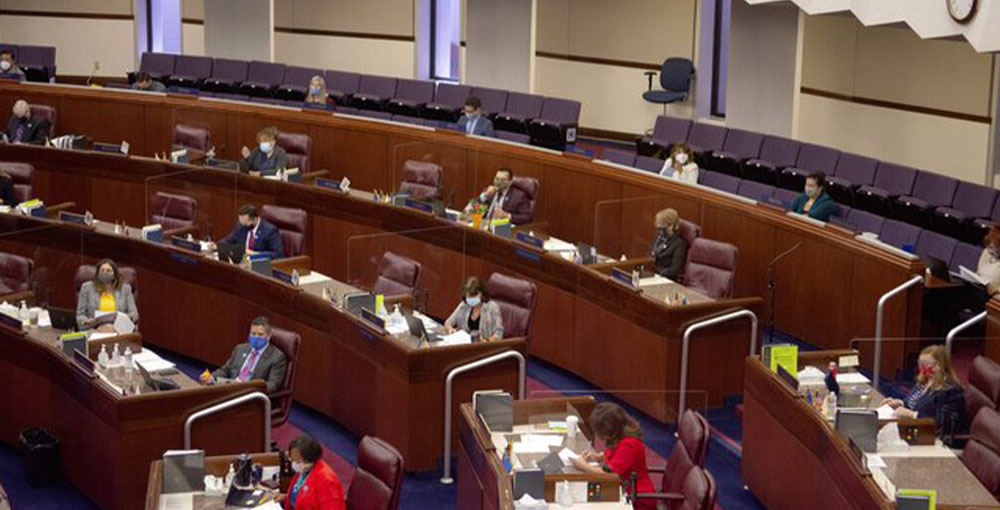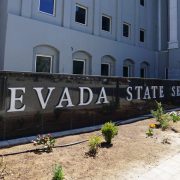By Grace Da Rocha (contact)
Tuesday, March 4, 2025 | 8:06 p.m.
https://lasvegassun.com/news/2025/mar/04/lawmakers-present-bill-to-explore-public-rail-syst
Transit labor unions, environmental organizations and citizens across Nevada shared their support Tuesday night for Assembly Bill 256, which aims to take the first steps to possibly bring public rail systems to Nevada’s largest counties.
If passed, AB 256 would direct the Legislative Commission to appoint a Regional Rail Transit Advisory Working Group to conduct an interim study on the development of regional rail systems in Clark and Washoe counties.
“This is an issue that is very important for my constituents (and) I think it’s important for many of your constituents for addressing traffic and emissions and all kinds of issues with getting around communities,” said Assemblywoman Selena La Rue Hatch, a sponsor of AB 256 who presented it during an Assembly Committee on Operations and Elections. “That is really our role here, a fully functioning regional transit system with rail is not a one session bill, but this is the first step — we believe — of many in getting there.”
There was no action taken on this bill Tuesday night.
AB 256 is sponsored by Assemblymembers La Rue Hatch, D-Reno; Cecelia González, D-Las Vegas; Erica Roth, D-Washoe; Cinthia Zermeño Moore, D-Las Vegas, and Natha Anderson, D-Las Vegas, with eight other Democratic Assemblymembers signed on as co-sponsors.
A 10-person working group would be convened to study the feasibility of regional rail transit in Northern and Southern Nevada.
It would be required to have one member each representing a rail or public transit labor union in Clark and Washoe counties; a member of both the Regional Transportation Commissions of Clark and Washoe counties; two legislators; a rail or transit private business representative; a person who represents Clark County or another local jurisdiction; a person who represents Washoe County or another local jurisdiction; and one person from Clark and Washoe counties with an interest or expertise in rail transit.
The Legislative Commission can also appoint two nonvoting members to advise or support the Regional Rail Transit Advisory Working Group, the bill says.
From 2025 to 2026, the working group would analyze the current state of regional rail and public transit in Clark and Washoe counties; the need for regional rail transit; potential sources of funding to support rail development; and any public or private entities that should be involved in the planning, development and implementation of a rail system in each county.
Regional Rail Transit Advisory Working Group members would serve without compensation and receive no per diem or travel expenses.
The bill, if passed, will become effective on July 1, 2025. The working group must prepare and submit their written findings report and action plan for developing a rail system to the Director of the Legislative Counsel Bureau by July 1, 2026.
The report, which would include any legislative recommendations, and plan would then be heard by the Joint Interim Standing Committee on Growth and Infrastructure.
AB 256 isn’t the first bill that has floated the possibility of establishing regional rail systems in Nevada, La Rue Hatch said. The last two bills related to rail systems were brought up in 2017 but enabled only Clark County to engage in rail public transit.
La Rue Hatch stressed there was never a mandate, plan or public funding for a regional rail system in Clark County.
In 2021, the Nevada Department of Transportation (NDOT) completed an updated Nevada State Rail Plan to assess Nevada’s current rail system and “highlight what an efficient rail transportation system could do for the state,” said Anne Macquarie, a member of the Nevada Rail Coalition, a group of over a dozen organizations pushing to build a “robust rail system” in the state.
The plan found that “the state’s existing rail footprint offers a firm foundation for cost-effective passenger rail.”
Gabe Christenson, state legislative director for SMART-TD Local #1043, which represents railroad conductors and engineers, told lawmakers on Tuesday that establishing regional rail systems in Nevada could alleviate traffic and lead to business development, especially as areas like Clark County continue to grow.
He stressed that there are “billions” in federal funds available for rail transit projects, and insisted that these systems are typically more flexible than roadways because they carry more people per ride and services can be adjusted based on demand.
Macquarie added that “a rail system produces savings to society” in lower vehicular deaths, pollution emissions and household spending on transportation expenses – such as cars or rideshare services.
“The need for solutions is growing more and more important every day,” Christenson said. “Ultimately, there is no one perfect solution, but this commission would help look at another option to fix the problems our state is facing.”
Following their presentation, committee members inquired about rural representation in the working group and challenges with using existing railroad systems in the state. Most lawmakers were supportive of bringing regional rail systems to the state, drawing examples from cities such as Chicago, Denver and Boston.
Only one person voiced their opposition for AB 256, but groups of environmental organizations and various labor unions pledged their support on Tuesday night.
Representatives from the Sierra Club Toiyabe Chapter, Nevada Environmental Justice Coalition, Nevada Conservation League, Regional Transportation Commission of Washoe County, Nevada AFL-CIO and Regional Transportation Commission of Southern Nevada were some of those who publicly backed the bill.
Southern Nevada resident Minjia Yan called AB 256 “a crucial step towards addressing our state’s growing population and transportation needs and economic development.” She told lawmakers that people are avoiding areas like downtown Las Vegas and the Spring Mountain corridor because of traffic, but a reliable rail system could change that.
It would also help with the economic development of Las Vegas and Washoe, as well as other areas along the transit routes by creating jobs and opportunities for retail near stations.
“Nevada is competing with other states to attract young, good talent and companies in different industries, and we need to have a regional rail network to maintain our economic competitiveness,” Yan said. “As someone who grew up in Las Vegas and am a proud Nevadan, I want to emphasize that our cities and state were not filled by thinking small. So, the question is not what we can afford to invest in the regional rail system, it’s whether we can afford not to.”
https://lasvegassun.com/news/2025/mar/04/lawmakers-present-bill-to-explore-public-rail-syst







